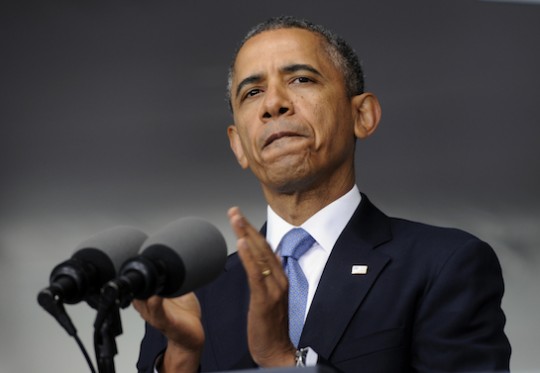We all know that President Obama "doesn’t give himself enough credit" for being such a strong leader when it comes to foreign policy. So maybe he predicted the "icy" response to his West Point commencement address on Wednesday, which was almost universally panned, even by the New York Times.
That’s why he called in backup:
President Barack Obama held a private ninety-minute lunch meeting with foreign policy journalists on Tuesday, just before delivering a public address at which he announced plans to remove U.S. troops from Afghanistan by the end of 2016.
Over a chicken lunch in the Roosevelt Room, the president led a wideranging discussion on Afghanistan, his forthcoming commencement speech at West Point, and other foreign policy matters with the likes of Thomas Friedman, David Brooks, E.J. Dionne and Jeffrey Goldberg, among others.
An impressive assortment of Thought Leaders, that. CNN’s Fareed Zakaria, and the Atlantic’s Peter Beinart also attended, a fact that appears self-evident upon reading their respective assessments of the president’s speech.
Here’s Beinart comparing Obama to Dwight Eisenhower:
It’s no surprise that at West Point, Obama yet again quoted Dwight Eisenhower. Like Obama, Eisenhower spent much of his presidency arguing against critics who claimed that the United States needed to spend more on defense, or intervene more militarily, because America’s enemies were gaining ground. Ike never believed that. He worried less that the Soviet Union would vanquish the U.S. militarily than that it would provoke an overreaction that bankrupted America economically. The Soviets, he argued, "have hoped to force upon America and the free world an unbearable security burden leading to economic disaster." …
That’s clearly Obama’s model: End costly, unwinnable wars, don’t start new ones, and rebuild the economic foundation of American power. I suspect Obama takes comfort in the fact that for the past several decades, many historians have applauded Eisenhower’s foreign policy. One influential academic essay even calls him a foreign-policy "genius."
He "suspects" this, presumably, because it’s what Obama told him at their private meeting.
Shockingly, Zakaria came to the same conclusion, in a piece titled "Obama’s leadership is right for today":
"Just because we have the best hammer does not mean that every problem is a nail," he said in his speech Wednesday at West Point. A similar sentiment was expressed in the farewell address of President Dwight D. Eisenhower, a strong leader who refused to intervene in the Suez crisis, the French collapse in Vietnam, two Taiwan Strait confrontations and the Hungarian uprising of 1956. At the time, many critics blasted the president for his passivity and wished that he would be more interventionist. A Democratic Advisory Council committee headed by Acheson called Eisenhower’s foreign policy "weak, vacillating, and tardy." But Eisenhower kept his powder dry, confident that force was not the only way to show strength. "I’ll tell you what leadership is," he told his speechwriter. "It’s persuasion — and conciliation — and education — and patience . It’s long, slow, tough work. That’s the only kind of leadership I know — or believe in — or will practice."
Maybe that’s the Obama Doctrine.
To be fair, it’s unclear if this is the result of a coordinated messaging operation or mere plagiarism, which Zakaria is known to engage in from time to time.
Dionne, who rarely writes about foreign policy, similarly praised the president for outlining a "doctrine where restraint makes us stronger," and for "throwing down the gauntlet" to America’s enemies his political opponents.
Friedman went ahead and declared victory on behalf of Obama in Ukraine. "In the end, it was Putinism versus Obamaism, and I’d like to be the first on my block to declare that the "other fellow"—Putin—"just blinked," the Thought Leader wrote in the New York Times.
Oh, and in case you were wondering: No, Obama is not like Dwight Eisenhower.
